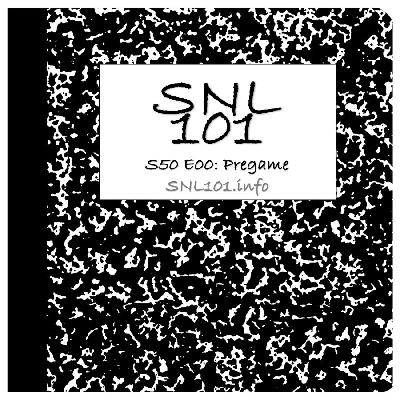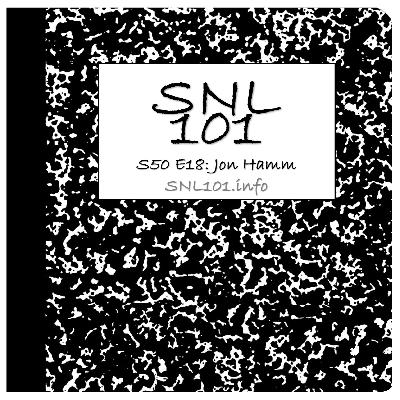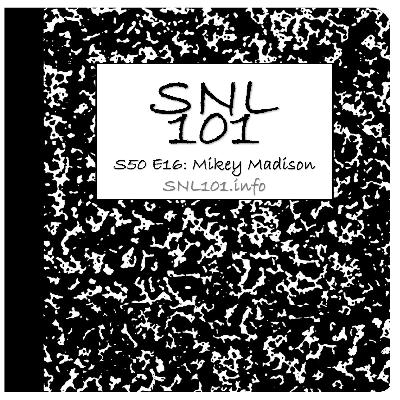Discover SNL101
SNL101

48 Episodes
Reverse
Charisse, Luvell, and Chuck get together before the premiere of SNL Season 50 to talk about hopes, dreams, and fears for the new season. We also discuss Farnsworth's Dream, Bargatze's opening sketch at the 2025 Emmys.
After a year of celebrations, reflections, and clip shows, Scarlett Johansson hosts the season finale of the 50th season on May 17, 2025 for a record-setting seventh time. We talk about the power of news parody with Local News Stories and Press Junket, as well as the complexity of humorous gaze with Couples at the Bar and food Ethics in Victorian Ladies Who Lunch. We also discuss Mike Myers Elevator Ride and Joke Swap.
Walton Goggins’ hosting debut on May 10, 2025 was a wild romp that embraced his newfound sex symbol status and delivered hearty guffaws and gasps. We discuss the construction of slapstick with A Guy Who Just Walked into a Spiderweb on Trump's Tariffs and the complexity of racial representation in The Movie Guy on Upcoming Summer Blockbusters, both segments on Weekend Update, as well as the humor potential of revealing intimate spaces in Boss’s Bathroom, A Dan Bulla Short. We also break down The Second Amendment and Mother’s Day Brunch. Readings include a reflection on Commedia Dell’Arte, an interview with Sofia Veragara, and reflections on the second amendment from legal scholars to Dave Chappelle.
Quinta Brunson was a delight in her second time hosting on May 3, 2025. Her presence was refreshing and she carried her sketches with a joy that was infectious. We discuss the inside humor of racial epithets on Weekend Update: Two Applebee’s Barflies Duke and Darlene, the complicated experience of laughing at oneself in Two Bitches vs. a Gorilla and Forever 31, and the racial politics of time in Will and Todd’s Radical Experience. Readings include a SCOTUS briefing on racial epithets, explorations of intersectional womanhood, and “The Chronopolitics of Racial Time,” a 2020 essay by Charles Mills. Check out more videos in additional resources along with our reflections on Quinta’s hosting debut in S48E16.
Charisse L’Pree and Chuck Hayward keep the conversation going to talk about Lizzo’s appearances in S50E18 hosted by Jon Hamm. We discuss Lizzo’s quiet-but-loud activism, the writers’ limited use of her in the episode, and how celebrity scandal operates in the ecosystem of Saturday Night Live. Chuck also connects Lizzo’s performance to Janet Jackson’s post-Superbowl episode 21 years ago on April 10, 2004.
Jon Hamm understood the assignment in his 4th time as host on April 12, 2025. We discuss satirizing socioeconomic inequality in Check to Check Business News, civil disobedience with Emil Wakim on American Patriotism, and the complexity of roasting and comedy writing via Guess! The Correct! Answer!, Gay Parents, and The White Potus. Readings address psychological impacts of socioeconomic class, Henry David Thoreau’s essay on the relationships between individual citizens and government, and readings from our cohosts on the ethics of satire and humor. Stay tuned for a bonus conversation with Charisse L’Pree and Chuck Hayward on Lizzo, the paucity of popular protest music, and comedy post scandal.
We talk with Immy Farukhi, an entertainment lawyer and professor at Syracuse University, about the legal frameworks around obscenity, indecency, and satire in media—particularly in the context of Ego Nwodim's appearance on Weekend Update. We discuss the legal distinctions between "obscene" (not protected by the First Amendment) and "indecent" (protected but regulatable). We also the role of satire and how SNL's political commentary, even when crude or biting, is protected under the First Amendment despite the inherent political nature of the FCC. Prof. Farukhi emphasizes the importance of nuanced legal education, teaching students to analyze legal tests and apply them to real-world situations, fostering critical thinking rather than black-and-white answers.
Jack Black’s 4th time hosting on April 5, 2025 was a refreshingly silly reprieve, from current events and a string of underwhelming episodes. We discuss the implications of the call-and-response-gone-wrong in Weekend Update: Ego Nwodim on the White House Correspondents' Dinner, ethical non-monogamy in Making Love, and the potential of framing to disrupt collective memory in Times Square Kiss. We also discuss The First Play through the lens of learning to engage with media, the psychology of heckling, and imaginative resistance. Entertainment attorney and Newhouse TRF Professor Immy Farukhi also shares his strategy for teaching obscenity and indecency. Readings include developmental and relationship psychology, the context of offense, and the rise of heckling.
Mikey Madison’s hosting premiere on March 29, 2025 was largely unimpressive and was overshadowed by Morgan Wallen’s abrupt departure during the closing credits. We discuss punching down and missed opportunities as well as the art of waiting in Big Dumb Line, reboot culture in Please Don’t Destroy - Mikey Madison is Squidward, and the dynamics of inside jokes with Devon Walker Shares his Morning Routine. Readings include the cultural and industry significance of reboots and the importance of waiting and patience in an increasingly on demand world.
Lady Gaga’s second time hosting (and as musical guest) on March 8, 2025 generated a lot of feelings, some good, some bad, some funny, some sad. We discuss the power of satire in the Trump, Musk and Rubio Meeting Cold Open, satirizing masculinity and power in Weekend Update: Lord Gaga on His Unwavering Support for His Wife Lady Gaga, the manic pixie dream girl and commodity feminism in Mascara Commercial, and language and power in No More Slay. Readings include the social history of single women in the United States, the effects of income imbalance within marriages, and a 1979 essay by James Baldwin entitled,” If Black English Isn't a Language, Then Tell me What Is.”
Shane Gillis’ second time hosting on March 1, 2025 showcased the potential of a host to “make the show his own;” Gillis was clearly active in the writers room and appeared in every sketch. We discuss how to satirize stereotypes in the Stand Up Monologue and Mid-Day News 2, the difficulty in satirizing Trump in the Cold Open, the trolley problem in Jane Wickline Gives Dating Advice, and the absurdity of direct to consumer drug ads in CouplaBeers. Readings include critical analyses of pornography, the complexity of drug ads, and a takedown of a beloved philosophical problem.
We talk with Dr. Dan Amernick, Senior Professional Lecturer and department chair of Media Arts at Marist University. We discuss the show's transformation from an experimental comedy space to a corporate-driven institution, its role in shaping political discourse, and how it has both reflected and influenced American culture over 50 years. The conversation explores the rise of celebrity cameos, the diminishing space for emerging cast members, and the commercialization of SNL’s once-subversive edge. Is the show still a groundbreaking force in comedy, or has it become a self-congratulatory institution? Tune in for a deep dive into the history, humor, and legacy of SNL.
We talk with Dr. Noël Carroll, distinguished professor of philosophy, film and media cultures at the Graduate School at the City University of New York (CUNY) and a leading figure in contemporary philosophy of art. We discuss SNL’s reinvention of classic comedy formats, its role in shaping political satire, and its connections to countercultural movements. Carroll reflects on whether SNL is truly subversive or simply a product of capitalist entertainment, and the group debates the show's longevity in a changing media landscape. Is SNL an enduring institution or an aging relic? Tune in for a thought-provoking discussion on comedy, art, and cultural transformation.
We talk with Dr. Robert Thompson, the founding director of the Bleier Center for Television and Popular Culture and a Trustee Professor of Television and Popular Culture at the S.I. Newhouse School of Public Communications at Syracuse University. We discuss its evolution, cultural impact, and role in political satire. From its nostalgic anniversary special to its function as a talent incubator, they explore SNL’s strengths, shortcomings, and digital-age relevance. The conversation critiques the show’s tendency toward superficial political humor, its struggles with inclusivity, and the limitations of network television in fostering truly subversive comedy. Finally, they speculate on the show's future—does SNL have only five years left? Tune in for a sharp and insightful discussion on one of TV’s most iconic institutions.
In this special episode of SNL101, we are joined by comedy scholars Brittney Michelle Edmonds, Danielle Fuentes Morgan, and Raul Perez, as well as friend of the pod Chuck Hayward, to discuss 50 years of Saturday Night Live through the lens of the 50th Anniversary Special, aired on February 16, 2025. We talk about the show’s role in establishing comedy across the 20th and 21st centuries from Word Association to Black Jeopardy, its complicated relationship with representing Blackness and Black humor exemplified in the In Memoriam montage, and how this epic oeuvre can be used to foster conversations in the classroom. We also introduce three featured players who bring a unique skill set: Noël Carroll discusses SNL as a comedy innovator, Bob Thompson spotlights the tailored nostalgia of the anniversary special, and Dan Amernick takes us back to when Lorne Michaels was dropped from the network. Readings include articles and books from the hosts and our panel.
Timothée Chalamet’s third time hosting on January 25 2025 did not necessarily disappoint, but some fan favorites like SmokeChedda TheAssGetta and Tiny Horse were noticeably absent. We discuss James Austin Johnson’s ability to impersonate Trump’s haughty cruelty in Founding Fathers Cold Open, the role of AI in interpersonal relationships in AI Software, and the power intra Black conversations in Giselle, A Concerned Businesswoman, on Trump's Executive Orders. We are again honored to have Chuck Hayward join us as we also unpack Oedipal Arrangements, God - An SNL Animated Short, and Bungee. Readings include current articles on the rise of conservatism in the United States, the psychology of education, AI, and collaborative creativity, and the history and effects of anti-Black hair discrimination.
Dave Chappelle’s fourth time hosting on January 18, 2025 featured a markedly mature appearance that balanced the political and the personal. We discuss his progressively classic Stand-Up Monologue and political aesthetics, journalism’s struggle in the current communication environment with MSNBC Special Coverage Cold Open, and the power of ambiguity and backstory in Evacuation Alert. We are joined in the virtual studio by friend of the pod, Chuck Hayward for an exciting conversation about Chappelle’s trajectory. Readings include a 15-year-old article from Oprah.com, a lesser known MLK speech from 1965, and Gramsci’s essays while imprisoned by the Italian Fascist regime in the 1920s.
Martin Short played the elder statesman during his fifth time hosting on December 21, 2024. This Christmas episode was filled with cameos, callbacks, and current events. We discuss the complexity of homelessness and the rhetoric of anti-woke publics in An Act of Kindness, the intractable intersection of gender and comedy in Parking Lot Altercation, and the winner of this year’s Joke Swap. Emmy nominated Chuck Hayward also joins to share his thoughts on demographic trends in the Five-Timers Club Cold Open. Readings include analyses of race, gender, and entertainment including Hanif Abdurraqib's 2022 collection of essays, A Little Devil in America: In Praise of Black Performance.
We talk about Chris Rock’s fourth time hosting on December 14, 2024. The alum anchors a largely forgettable episode, interlaced with a few showstopping bangers. We talk about impactful lines from Rock’s Opening Monologue, fan fictionalizing the 2022 Oscars Slap in Simpsons Christmas Gift, as well as racial memory and application with Grandpa’s Magic Car and Mall Santas. Readings include histories of standup and fan fiction as well as recent articles on honestly representing mythic and iconic figures.
Paul Mescal puts on an adequate performance in his SNL debut on December 7, 2024. We discuss spontaneity, creativity, and social comparison in Italian Restaurant Commercial, representations of masculinity in Please Don’t Destroy: Paul Mescal is Daddy, and the inconsistent appeal of multi and cross genre content in Gladiator II: The Musical and Shaboozy’s A Bar Song (Tipsy). Readings including a meta analysis of social comparison, philosophy and psychology of creativity, and a review of genre performances at the box office.























